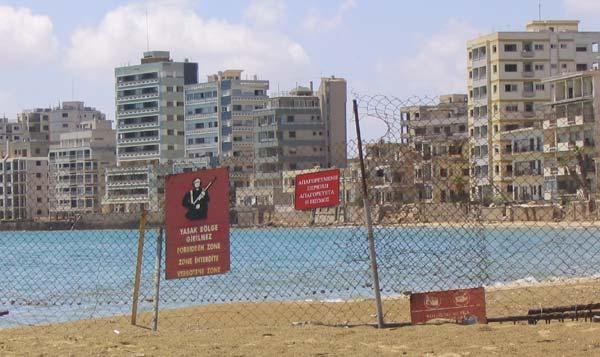In recent months I have been on an email list called Return to Varosha, Famagusta, Cyprus. I joined this list at the invitation of the moderator, who, I assume, must have come across my own Cyprus page. Participants include those who have had some connection with the Varosha section of Famagusta south of the old walled city, whose inhabitants were almost wholly Greek prior to the troubles of 1974. It is now an uninhabited ghost city, surrounded by a fence guarded (lightly, in some places) by the Turkish military.

David Koyzis
The abandoned city of Varosha
from south of the Green Line
Varosha was the centre of the tourist industry in Cyprus after independence in 1960 and for the next 14 years. I myself never had the opportunity to go there, but my father was raised there and my relatives were exiled from there in '74. Many people on this list have indeed lived there, and this includes some British families as well. I have been moved by their expressions of love for a place to which they cannot return. They tell of favourite restaurants, ice cream shops, beaches, hotels, schools, streets and other once familiar landmarks.
Although I can feel no nostalgia for a city where I've never been, I am getting a pretty good sense of the politics surrounding the issue of Famagusta, which is apparently being held as a sort of pawn by the Turks, to be used at some future negotation to settle the Cyprus issue.
Last year, in the runup to Cyprus' entry into the European Union, the people of both sides of the island voted in a referendum on the Kofi Annan Plan to unify the island. Turkish Cypriots in the north voted in favour, while Greek Cypriots in the south voted against, at the urging of their fairly new president, Tassos Papadopoulos.
To be sure, the plan was inequitable in many respects, although the list members have mentioned another reason for its rejection which had not occurred to me before. Since 1974, much of the tourist industry has moved south to such cities as Paphos, Limassol and Ayia Napa, the last of which was once a sleepy village now turned into a garish resort city. If the north is opened up and the barriers removed, much of the tourism on which the south is dependent could move to the less expensive north. If the Varosha section of Famagusta is reopened, these southern cities could end up suffering economically as a consequence. Since no one wishes to see his restaurant or hotel lose business, he would quite naturally vote to maintain the status quo — which means no to the Annan Plan.
Former residents of Famagusta look at this differently, of course. They just want to go home. Their houses are deteriorating physically and badly need to be restored. All they want is to reclaim something of their former lives in a city cruelly taken from them. If this means accepting an imperfect settlement to a three-decade-old stalemate, so be it.

Return to Varosha
The fence around Varosha
My prayer is that they will indeed go home again before too long. To paraphrase the Jewish Passover liturgy: Next year in Varosha. . . .

No comments:
Post a Comment